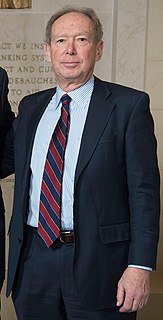A Quote by Sharan Burrow
Limiting the destructive risk-taking by large financial firms and banks which are 'too big to fail' is needed.
Related Quotes
Financial institutions have been merging into a smaller number of very large banks. Almost all banks are interrelated. So the financial ecology is swelling into gigantic, incestuous, bureaucratic banks-when one fails, they all fall. We have moved from a diversified ecology of small banks, with varied lending policies, to a more homogeneous framework of firms that all resemble one another. True, we now have fewer failures, but when they occur... I shiver at the thought.
It is worth noting that 'too big to fail' is not simply about size. A big institution is 'too big' when there is an expectation that government will do whatever it takes to rescue that institution from failure, thus bestowing an effective risk premium subsidy. Reforms to end 'too big to fail' must address the causes of this expectation.
Fannie Mae and Freddie Mac - two bloated and corrupt government-sponsored programs - contributed heavily to the crisis.In order to prevent another crisis, we need to do what we should have done years ago - reform Fannie Mae and Freddie Mac. We also need to repeal Dodd-Frank, the Democrats' failed solution. Under Dodd-Frank, 10 banks too big to fail have become five banks too big to fail. Thousands of community banks have gone out of business.




































